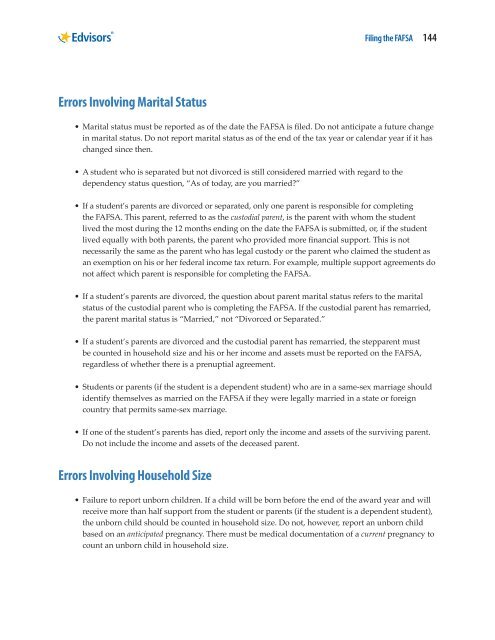filing-the-fafsa-2015-2016-edition
filing-the-fafsa-2015-2016-edition
filing-the-fafsa-2015-2016-edition
Create successful ePaper yourself
Turn your PDF publications into a flip-book with our unique Google optimized e-Paper software.
Filing <strong>the</strong> FAFSA 144<br />
Errors Involving Marital Status<br />
• Marital status must be reported as of <strong>the</strong> date <strong>the</strong> FAFSA is filed. Do not anticipate a future change<br />
in marital status. Do not report marital status as of <strong>the</strong> end of <strong>the</strong> tax year or calendar year if it has<br />
changed since <strong>the</strong>n.<br />
• A student who is separated but not divorced is still considered married with regard to <strong>the</strong><br />
dependency status question, “As of today, are you married”<br />
• If a student’s parents are divorced or separated, only one parent is responsible for completing<br />
<strong>the</strong> FAFSA. This parent, referred to as <strong>the</strong> custodial parent, is <strong>the</strong> parent with whom <strong>the</strong> student<br />
lived <strong>the</strong> most during <strong>the</strong> 12 months ending on <strong>the</strong> date <strong>the</strong> FAFSA is submitted, or, if <strong>the</strong> student<br />
lived equally with both parents, <strong>the</strong> parent who provided more financial support. This is not<br />
necessarily <strong>the</strong> same as <strong>the</strong> parent who has legal custody or <strong>the</strong> parent who claimed <strong>the</strong> student as<br />
an exemption on his or her federal income tax return. For example, multiple support agreements do<br />
not affect which parent is responsible for completing <strong>the</strong> FAFSA.<br />
• If a student’s parents are divorced, <strong>the</strong> question about parent marital status refers to <strong>the</strong> marital<br />
status of <strong>the</strong> custodial parent who is completing <strong>the</strong> FAFSA. If <strong>the</strong> custodial parent has remarried,<br />
<strong>the</strong> parent marital status is “Married,” not “Divorced or Separated.”<br />
• If a student’s parents are divorced and <strong>the</strong> custodial parent has remarried, <strong>the</strong> stepparent must<br />
be counted in household size and his or her income and assets must be reported on <strong>the</strong> FAFSA,<br />
regardless of whe<strong>the</strong>r <strong>the</strong>re is a prenuptial agreement.<br />
• Students or parents (if <strong>the</strong> student is a dependent student) who are in a same-sex marriage should<br />
identify <strong>the</strong>mselves as married on <strong>the</strong> FAFSA if <strong>the</strong>y were legally married in a state or foreign<br />
country that permits same-sex marriage.<br />
• If one of <strong>the</strong> student’s parents has died, report only <strong>the</strong> income and assets of <strong>the</strong> surviving parent.<br />
Do not include <strong>the</strong> income and assets of <strong>the</strong> deceased parent.<br />
Errors Involving Household Size<br />
• Failure to report unborn children. If a child will be born before <strong>the</strong> end of <strong>the</strong> award year and will<br />
receive more than half support from <strong>the</strong> student or parents (if <strong>the</strong> student is a dependent student),<br />
<strong>the</strong> unborn child should be counted in household size. Do not, however, report an unborn child<br />
based on an anticipated pregnancy. There must be medical documentation of a current pregnancy to<br />
count an unborn child in household size.


